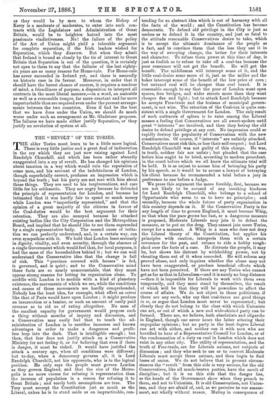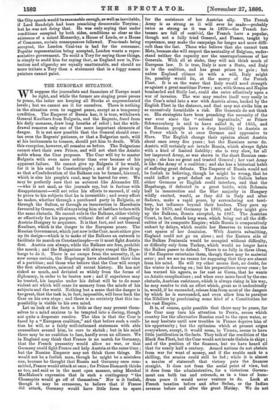THE " REVOLT " OF THE TORIES.
THE older Tories must learn to be a little more logicaL There is very little justice and a great deal of indiscretion in the cry which they are just now raising against Lord Randolph Churchill, and which has been rather absurdly exaggerated into a cry of revolt. He has changed his opinions about taxation in a way which would ruin the reputation of some men, and his account of the indebtedness of London, though superficially correct, produces an impression which is beyond the truth ; but his party are not sore with him about those things. They are used to his tergiversations, and care little for his arithmetic. They are angry because he defended the principle of representation for London, and because he intimated that it was hardly fair to spend so much money while London was "imperfectly represented," and that the opinion of a great majority of the citizens in favour of the Coal-duties would be the best argument for their retention. They are also annoyed because he attacked existing bodies like the City Corporation and the Metropolitan Board, and implied that he should like to see them superseded by a single representative body. The second cause of irrita- tion we can perfectly understand, and, in a certain way, can even sympathise with it. We hold that London loses seriously in dignity, vitality, and even security, through the absence of a single Government which would feel that, for local purposes, it had the mass of the householders behind it ; but we can well understand the Conservative idea that the change is full of risk. This "province covered with houses" is fed, is governed, and is quiet; and to the Conservative mind those facts are so nearly unaccountable, that they must appear strong reasons for letting its organisation alone. To meddle with London is to meddle with a kind of planetary existence, the movements of which we see, while the conditions and causes of those movements are hardly comprehended. Nobody has the least idea, for example, what effect an octroi like that of Paris would have upon London ; it might produce an insurrection or a famine, or such an amount of easily paid revenue as to rid us of rating altogether. No man of the smallest capacity for government would propose such a thing without months of inquiry and discussion, and a Conservative may easily feel that to touch the ad- ministration of London is to sacrifice immense and known advantages in order to make a dangerous and profit- less leap into the dark. That is intelligible enough ; but then, that fear does not justify attack on a Conservative
Ministry for not feeling it, or for believing that even if there is danger, it must be risked. It would have justified the attack a century ago, when all conditions were different ; but to-day, when a democracy governs all, it is Lord Randolph Churchill, not his opponents, who is in the logical position. He only says the people must govern London as they govern England, and that the size of the Metro- polis is no more excuse for refusing it representation than the increase of population is a reason for refusing it to Great Britain ; and surely both assumptions are true. The Tory must acccept the Constitution just as much as the Liberal, unless he is to stand aside as an impracticable, con- tending for an abstract idea which is out of harmony with all the fads of the world ; and the Constitution has become democratic. To defend old privilege in the City is just as useless as to defend it in the country, and just as fatal to the attitude reasonable Conservatives desire to take, which is to accept the ultimate dominance of the people as a fact, and to convince them that the less they use it in the way of sweeping change, the better for their interests and character. To refuse them power at this time of day, is just as foolish as to refuse to take off a coal-tax because the poor consumer will not get the benefit. He will get the benefit. The middleman will intercept some of it, and the little coal-dealer some more of it, just as the miller and the baker intercept some of the benefit of the low price of corn ; but untaxed coal will be cheaper than coal taxed. It is reasonable enough to say that the poor of London want open spaces, free bridges, and wider streets more than they want cheaper fire and light ; but to attack Lord Randolph because he accepts Free-trade and the truisms of municipal govern- ment, is not wise. The retention of the Coal-tax is quite con- sistent with a single Government for London. The only result of such outbursts of spleen is to raise among the Liberal masses a feeling that Conservatives are all sweet-spoken until great " interests " are involved, and then they betray the old desire to defend privilege at any coat. No impression could so rapidly destroy the popularity of Conservatism with the new constituencies. Of course, if " interests " are unfairly attacked, Conservatives must risk this, or lose their self-respect ; but Lord Randolph Churchill was not guilty of this charge. He was, in truth, neither fair nor unfair ; but pleaded that the case before him ought to be tried, according to modern precedent, in the court before which we all know the ultimate trial will be held. It is as unjust to accuse him of betraying his party by his speech, as it would be to accuse a lawyer of betraying his client because he recommended a trial before a jury in preference to one before a Judge.
We press this argument the more forcibly, first, because we are not likely to be accused of any sneaking kindness for Lord Randolph Churchill, who belongs to a school of Opportunists who seem to us to have no principles ; and secondly, because the whole future of party organisation this country depends on it. If the Conservative Party is for any length of time to govern England, it must become Whig, so that when the pace grows too fast, or a dangerous measure is proposed, Moderate Liberals may join it to defeat the measure, or to put on the drag. They cannot join mere Tories, except for a moment. A Whig is a man who does not deny the Liberal theory of the Constitution, but applies his principles with caution, interprets them with a certain reverence for the past, and refuses to ride a hobby rough- shod over the facts of a case. He distrusts the people, it may be, but shows his distrust by withholding power, not by cheating them out of it when conceded. He will reform any proved abuse, and only inquires whether the abuse may not have been exaggerated, or produce beneficial effects which have not been perceived. If there are any Tories who cannot get as far as that in Liberalism—and it is surely no long distance —then it is impossible for Liberals to work with them even temporarily, and they must stand by themselves, the result of which will be that they will be powerless to affect the course of affairs. We do not object to those politicians, if there are any such, who say that coal-taxes are good things in ae, or argue that London must never be represented ; but clearly they do not belong to the class with which Unionists can act, or out of which a new and wide-skirted party can be formed. There are, we believe, both absolutists and oligarchs in England, though one never hears the latter uttering their unpopular opinions ; but no party in the least degree Liberal can act with either, and neither can it with men who are horrified to hear of a Representative Council for London, or of the condemnation of a duty on coal in London which does not exist in any other city. The utility of representation, and the truth of Free-trade, are for Liberals axioms, not subjects of discussion ; and they who seek to use or to convert Moderate Liberals must accept those axioms, and then begin to find bases of union. We do not believe that in present circum- stances the " revolt" from this side is very serious, for the old Conservatives, like all much-beaten parties, have the merit of discipline ; but it is on this side that the danger lies,
as the heads of the Government show when they preach to them, and not to Unionists. It is old Conservatism, not Union- ism, and they are afraid of, and, as we perceive to our amaze- ment, not wholly without reason. Mutiny in consequence of
the City speech would be reasonable enough, as well as inevitable, if Lord Randolph had been preaching democratic Toryism ; but he was nob doing that. He was only saying that under conditions accepted by both sides, conditions as clear as the existence of a mixed Monarchy, a House of Lords, or a House of Commons, certain consequences followed. Free-trade being accepted, the London Coal-tax is bad for the consumer. Popular representation being accepted, London wants a repre- sentative government. To scold a Tory for saying those things, is simply to scold him for saying that, as England now is, Pro- tection and oligarchy are equally unattainable, and should no more irritate a Tory than a statement that in a foggy season painters cannot paint.







































 Previous page
Previous page